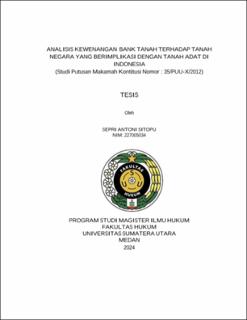| dc.contributor.advisor | Harris, Abd | |
| dc.contributor.advisor | Nasution, Mirza | |
| dc.contributor.author | Sitopu, Sepri Antoni | |
| dc.date.accessioned | 2025-05-28T01:27:12Z | |
| dc.date.available | 2025-05-28T01:27:12Z | |
| dc.date.issued | 2024 | |
| dc.identifier.uri | https://repositori.usu.ac.id/handle/123456789/104172 | |
| dc.description.abstract | Land is one of the natural resources listed in Article 33 of the 1945 Constitution and is implemented based on national land law in the Basic Agrarian Law. The government has an obligation to manage land for the greatest prosperity of the people. The problem in land management is the difficulty in procuring land for the public interest. Much land is controlled by brokers or land speculators that are abandoned. This condition hampers national development and requires enormous funding. To overcome this, the government formed a Land Bank which is regulated in Law Number 11 of 2020 concerning Job Creation. This study aims to describe and explain the regulation of the Land Bank in the Job Creation Law and the PP on the Land Bank Agency and the implications for national land law.
Land problems in Indonesia have increased along with the presence of Law Number 11 of 2020 concerning Job Creation. The regulation of the Land Bank in the Land cluster in the law is an important topic to pay attention to because it is a crucial part of land practices. This paper will examine the problematic regulation of the Land Bank, starting from institutional problems and legal problems in particular. This paper uses normative legal research methods using a statutory and conceptual approach. The results of the study indicate that the presence of the Land Bank Agency has great potential to cause overlapping authority between institutions in the land sector. Fulfillment of the value of justice is needed to create a balance of rights and obligations between the parties involved in the implementation of the land bank. Fulfillment of the value of legal certainty is intended so that the state guarantees legal certainty in the form of laws and regulations that specifically regulate the implementation of land banks in Indonesia. The value of benefit means that all efforts in the implementation of the land bank must provide great benefits, especially for the welfare of the people. | en_US |
| dc.language.iso | id | en_US |
| dc.publisher | Universitas Sumatera Utara | en_US |
| dc.subject | Land Bank | en_US |
| dc.subject | Land Law | en_US |
| dc.subject | Benefits | en_US |
| dc.title | Analisis Kewenangan Bank Tanah terhadap Tanah Negara yang Berimplikasi dengan Tanah Adat Di Indonesia (Studi Putusan Makamah Kontitusi Nomor : 35/PUU-X/2012) | en_US |
| dc.title.alternative | Analysis of Land Bank Authority Over State Land With Implications for Customary Land in Indonesia (Constitutional Court Decision Study Number: 35/PUU-X/2012) | en_US |
| dc.type | Thesis | en_US |
| dc.identifier.nim | NIM227005034 | |
| dc.identifier.nidn | NIDN0111086001 | |
| dc.identifier.nidn | NIDN0026127203 | |
| dc.identifier.kodeprodi | KODEPRODI74101#IlmuHukum | |
| dc.description.pages | 116 Pages | en_US |
| dc.description.type | Tesis Magister | en_US |
| dc.subject.sdgs | SDGs 16. Peace, Justice And Strong Institutions | en_US |


